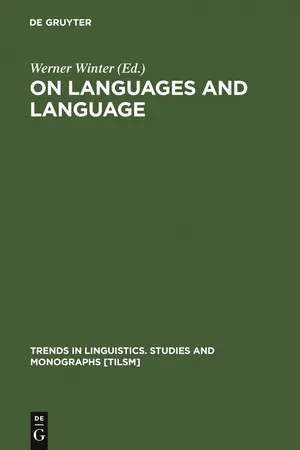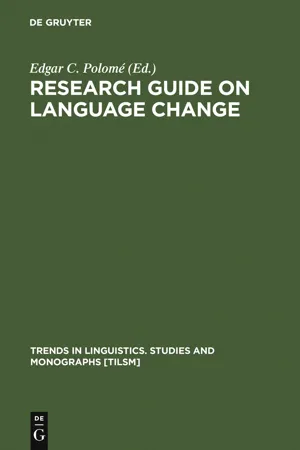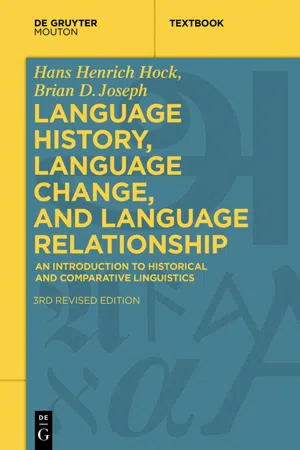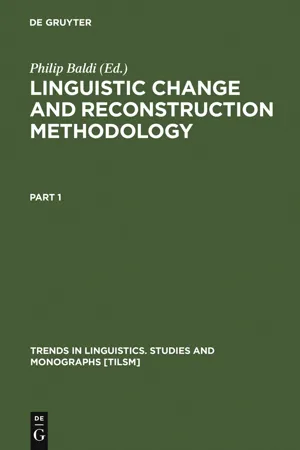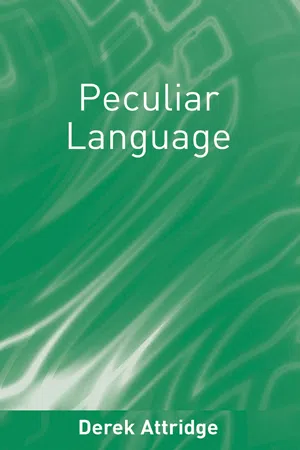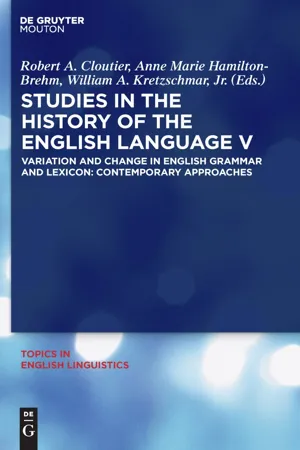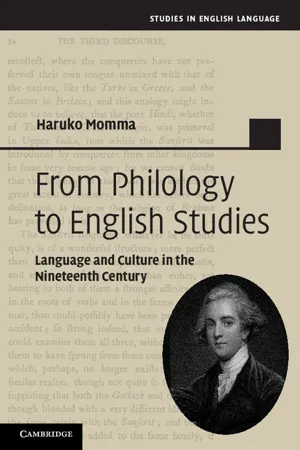Languages & Linguistics
Etymology
Etymology is the study of the origin and historical development of words, including their meanings and forms. It explores the evolution of words through tracing their roots, often across different languages and time periods. By examining etymology, linguists gain insights into the connections between languages and the cultural and historical influences that have shaped them.
Written by Perlego with AI-assistance
Related key terms
1 of 5
9 Key excerpts on "Etymology"
- eBook - PDF
On Languages and Language
The Presidential Adresses of the 1991 Meeting of the Societas Linguistica Europaea
- Werner Winter(Author)
- 2011(Publication Date)
- De Gruyter Mouton(Publisher)
They also reflect, of course, the debates dominating each period. We could finally turn to a third kind of source: modern dictionaries of linguistics. Given the present status of Etymology, however, it is not surprising to see that they do not add much to what we already know, as in (23). (23) [Etymology is] the study of the origins and history of form and meaning of words. (Crystal 1987: 420) On the whole, all these definitions, whether of dictionaries, of individual etymologists, or of modern linguists, are quite representative of the traditional conception of Etymology, in that they leave us approximately where we were at the beginning. Is Etymology a science? An investigation? A study? If it is an art, can we take it seriously in the present world of science? What kind of a history do words have: phonetic, semantic, both? Is Etymology an independent branch of linguistics, a part of lexicology, or something else? Does Etymology have to reach the origin of a word, Thirty-five definitions of Etymology 7 i.e., the earliest possible form? We could easily continue with such fundamental, yet unanswered, questions. My own attempt will be to break down the concept of Etymology into its componential features, following the theory of lexical structures (Alinei 1974; 1980 a). To begin with, we could observe that most modern definitions seem to have accepted Schuchardt's view, emphasizing the presence of both formal and semantic aspects in Etymology. This is, indeed, the most obvious assumption we could possibly make about Etymology. If we were to accept it, we could begin with a tentative statement of the kind presented in (24). (24) Whether Etymology studies the origin of words is not sure: what it does study is the history of words, and in particular their phonetic (including under this label also morphological) and semantic changes. - eBook - PDF
- Edgar C. Polomé(Author)
- 2011(Publication Date)
- De Gruyter Mouton(Publisher)
Etymology Edgar C. ΡοΙοπιέ The purpose of Etymology is to trace back the lexical component of a language to its origins and to describe the basic meaning, history, and development of the terms involved. It is therefore closely associated with historico-comparative linguistics, as it has to apply the rules of diachronic phonological and morphological change to determine the original form or reconstruct the prototype of each lemma in the language from which it originated — whether it be derived from a prehistoric protolanguage or some dialect of an earlier language, or borrowed from an outside source. The term Etymology — borrowed from the Old French into Middle English under the form ethimologie — derives ultimately from the Greek ετυμολογία which designated the attempts of the Greek philosophers to discover the true sense of the words according to their origin (Grk. το ετνμον), an endeavor which led to the two opposed schools of thought illustrated by Plato's Cratylus. While Cratylus defends the claim advanced by Heraclitus that there is a natural link (Grk. φύσει ) between name and object, Plato sides with Democritus who considers the attribution of names as a matter of arbitrary determination (Grk. θέσει), but he fails to draw the proper consequences from this view on account of his own concept of truth (Ducrot - Todorov 1983: 131). In the Middle Ages, purposeful etymological investigation was thwarted by theological concerns which fostered the belief in the monogenesis of language and the derivation of all tongues from Bib-lical Hebrew. Apart from some enlightened forerunners in the seven-teenth and eighteenth centuries, etymological research only started on a genuinely scientific basis with the development of linguistics in the - eBook - PDF
Language History, Language Change, and Language Relationship
An Introduction to Historical and Comparative Linguistics
- Hans Henrich Hock, Brian D. Joseph(Authors)
- 2019(Publication Date)
- De Gruyter Mouton(Publisher)
The study of the origin of words is known as Etymology. The first part of this word comes from Greek étymon ‘true sense of a word’, so that Etymology is 262 Lexical change and Etymology. The study of words the study of the true, i. e. original, forms of words. In a larger sense, Etymology is concerned with the history of words, how they arise, the factors that have affected their ultimate shape and meaning, the semantic paths they have taken in their development though time, and so on. Moreover, once we start exploring word origins, the question arises, too, as to where various phrases and expressions – idiomatic groups of words – come from. Why, for instance, do we say madder than a wet hen , rarer than hen’s teeth , raining cats and dogs , or on a wild goose chase , to take just a few animal-related expressions? Etymology is fascinating and clearly has great popular appeal, as the large number of books on word and phrase origins indicates. And many etymologies – or facts showing the absence of an etymological connection among words – do make for interesting trivia. For instance, although this may be hard to believe, the word canary ultimately derives from Lat. canis ‘dog’. The birds known as canaries bear their names because they originally came from the Canary Islands . These islands, in turn, were named in Latin after the large canes (pl.) ‘dogs’ found there. On the other hand, there is no etymological relationship between canary and the French word canard ‘duck’, even though one might at first glance think of such a connection; once you have canary and canard , can- in bird names seems like a promising morphological division (“birds of a feather …”). - Philip Baldi(Author)
- 2011(Publication Date)
- De Gruyter Mouton(Publisher)
Etymologies, equations, and comparanda: Types and values, and criteria for judgment Calvert Watkins Language change is a fact. I will not consider here the possible or probable causes of language variation and language change. For our purposes I prefer to stay with the simple Saussurian notion that all things change over time, and there is little reason why we should expect human language to be any different. The study of Etymology represents a pivotal dimension of the response of the science of linguistics to the empirical fact of language change. Now etymologies, as is well-known, are a good deal older than the science of linguistics, and a great deal more widespread. The making of etymologies by that or any other name is part of the metalinguistic techniques or operations of language speakers around the world, and has been since the documentation of human lan-guage. The urge to etymologize, like the cognate urge to pun, is deeply rooted in the human psyche; it is part of man's impulse to have power over his language, and thereby over the world it sym-bolizes. An Etymology removes the arbitrary nature from the lin-guistic sign, and substitutes control. Socrates in the Kratylos (409 c, d) is asked to etymologize 'fire' and 'water' He provides the expla-nation for 'water', by appeal to meaning, but claims he cannot do the latter, το πΰρ άπορώ he says, Ί give up on fire', yet the phonetic figure gives him away: πυρ πορ is his Etymology, by another route, that of sound. Small wonder that Etymology is enduringly appealing to the popular mind, and enduringly fraught with misunderstanding. There is no shortage of manuals and handbooks of Etymology. To mention only a few, of the postwar period, we have V. Pisani, L'Etimologia: storia—questioni—metodo (1947 1 , 1967 2 , German translation 1975); P. Guiraud, L'étymologie { 1964 1 , 1967 2 ); A. S. C. Ross, Etymology, with especial reference to English (1958); Y.- eBook - PDF
Patterns of Change - Change of Patterns
Linguistic Change and Reconstruction Methodology
- Philip Baldi(Author)
- 2013(Publication Date)
- De Gruyter Mouton(Publisher)
Etymologies, equations, and comparanda: Types and values, and criteria for judgment Calvert Watkins Language change is a fact. I will not consider here the possible or probable causes of language variation and language change. For our purposes I prefer to stay with the simple Saussurian notion that all things change over time, and there is little reason why we should expect human language to be any different. The study of Etymology represents a pivotal dimension of the response of the science of linguistics to the empirical fact of language change. Now etymologies, as is well-known, are a good deal older than the science of linguistics, and a great deal more widespread. The making of etymologies by that or any other name is part of the metalinguistic techniques or operations of language speakers around the world, and has been since the documentation of human lan-guage. The urge to etymologize, like the cognate urge to pun, is deeply rooted in the human psyche; it is part of man's impulse to have power over his language, and thereby over the world it sym-bolizes. An Etymology removes the arbitrary nature from the lin-guistic sign, and substitutes control. Socrates in the Kratylos( 409 c, d) is asked to etymologize 'fire' and 'water'. He provides the expla-nation for 'water', by appeal to meaning, but claims he cannot do the latter, το πυρ απορώ he says, Ί give up on fire', yet the phonetic figure gives him away: πυρ ... πορ is his Etymology, by another route, that of sound. Small wonder that Etymology is enduringly appealing to the popular mind, and enduringly fraught with misunderstanding. There is no shortage of manuals and handbooks of Etymology. To mention only a few, of the postwar period, we have V. Pisani, L'Etimologia: storia — questioni—metodo (1947 1 , 1967 2 , German translation 1975); P. Guiraud, L'étymologie (1964 1 , 1967 2 ); A. S. C. Ross, Etymology, with especial reference to English (1958); Y. - eBook - ePub
- Derek Attridge(Author)
- 2004(Publication Date)
- Routledge(Publisher)
(Sensible Words, xv; the whole introduction is valuable for its discussion of intellectual history). See also 120—21 below.Not surprisingly, the rise of the more rigorous enterprise of modern structural linguistics put paid to the scientific pretensions of Etymology—partly, no doubt, because the Saussurean divorce between synchrony and diachrony left no room for even the most attenuated hope that Etymology could illuminate current meanings. Saussure’s own comments on Etymology in the Course, in a brief Appendix to the section on diachronic linguistics (259—60/189—90), are predictably dismissive. Etymology, he asserts, mixes descriptions of sound-change and meaning-change, it draws indiscriminately on phonetics, morphology, semantics, and other branches of linguistics, it lacks a coherent methodology, and it fails to scrutinize its own procedures. Textbooks on language and linguistics now seldom have sections on Etymology, and although a fascination with the origins of words persists, it is more likely to manifest itself in the pages of the Sunday newspaper than in university seminar rooms. The occasional linguist who champions Etymology today has to do so in defensive terms; thus we find Yakov Malkiel writing of Etymology’s “temporarily forfeited controlling position within linguistics” (“Etymology and General Linguistics,” 219) as if it were a King Arthur whose time will come again. And Ernest Weekley is now less well remembered as the author of The Romance of Words than as the Nottingham professor who, in the year in which that volume was first published, introduced his wife Frieda to an ex-student of his named D. H. Lawrence.Word-History and Word-PlaySaussure’s exposure of the fallacy of assimilating current meaning to etymological derivation is antihistorical only insofar as it attacks a simplistic view of history and its relation to present structures of signification. In his distinction between a synchronic and a diachronic approach, Saussure poses two meanings of “history” against each other: history as the complex of social and material forces that modify the individual and the community in a succession of experienced presents, and history as a supraindividual, supracommunal, transtemporal continuum, genetically or teleologically oriented. Jameson, although he portrays Saussure’s distinction as a rejection of history, spells out very clearly the implications for historiography of the two kinds of linguistics, synchronic and diachronic: “The former lies in the immediate lived experience of the native speaker; the latter rests on a kind of intellectual construction, the result of comparisons between one moment of lived time and another by someone who stands outside, who has thus substituted a purely intellectual continuity for a lived one” (Prison-House, 6).20 - eBook - PDF
Studies in the History of the English Language V
Variation and Change in English Grammar and Lexicon: Contemporary Approaches
- Robert A. Cloutier, Anne Marie Hamilton-Brehm, William A. Kretzschmar, Jr., Robert A. Cloutier, Anne Marie Hamilton-Brehm, William A. Kretzschmar, Jr.(Authors)
- 2010(Publication Date)
- De Gruyter Mouton(Publisher)
The State of English Etymology (A Few Personal Observations) Anatoly Liberman 1. The Beginning: From Minsheu to Wedgwood The first dictionary of English Etymology appeared in 1617 (Minsheu 1617), and this is the conventional date marking the emergence of English Etymology as an independent branch of scholarship. In European lexi-cography, Minsheu was preceded only by Kiliaen (1599; Dutch). Both authors wrote their works in Latin. During the pre-Rask-Grimm epoch, researchers made useful etymological discoveries either by chance or when correct conclusions could not be missed. For example, no one doubted that Latin was the foundation of the Romance languages. We admire Socrates’ insights, as we know them from Plato’s Cratyllus , but the truly interesting part of the dialogue is devoted to the perennial ques-tion about the relation of sign and meaning. The etymologies o¤ered there are indefensible. Socrates and his interlocutors in Cratyllus knew only Greek and some Phrygian. seventeenth-and eighteenth-century scholars were aware of the multitude of languages around them, but their evolu-tionary model held out little promise. Debate centered on whether Latin arose from Greek or was a language in its own right. Hebrew enjoyed the status of a protolanguage. Hardly anyone doubted that Gothic gave birth to German, and in the second half of the nineteenth century Skeat still kept reminding his readers that German is not the progenitor of English. The greatest handicap in the work of early etymologists was their igno-rance of sound correspondences and, as a result, their dependence on near identical forms. Yet in one respect their comparison of modern languages with Hebrew, Greek, and Latin is instructive: it reminds us of how much in the history of words depends on chance and thereby teaches us caution. Unbelievably many look-alikes are almost too good to be wrong. - eBook - PDF
From Philology to English Studies
Language and Culture in the Nineteenth Century
- Haruko Momma(Author)
- 2012(Publication Date)
- Cambridge University Press(Publisher)
1 1 Introduction: where is philology? I am a philologist and not a philosopher – Paul de Man Love of words Lexicology, the study of words, is a division of linguistic research to which a major contribution was made in the nineteenth century. Various meth- ods philologists developed during this period may be collectively called historical principles, because they treated each and every word as an entity endowed with a temporal depth of its own. Historical principles helped lexicologists explain why some words had multiple meanings that seemed disparate and sometimes even contradictory with each other. For individ- ual users of a given language, the semantic patterns of polysemous words may seem infinitely varied and mysteriously intricate like the crystalline patterns of snowflakes. In the eyes of nineteenth-century philologists, each word had a semantic web whose design reflected its history concerning, for example, how long it had been in circulation and how widely it had been spread. Within a short span of time, a given word may exhibit so slight a semantic change that its departure from the existing sense would seem almost negligible. After sufficient time, however, the variation of sense thus accumulated could be substantial enough to make the word look semantic- ally schizophrenic. The trajectory of such alteration of meaning in a word would appear as a distinct pattern on its semantic web. If the word had retained much of its earlier usage, the pattern would exhibit shades of sense shifting gradually from one to the next. If it had lost many of its earlier meanings, its web would appear to have holes, hence obscuring connections among the currently available meanings. At least in its early stage, historical lexicology was restorative in nature, because it mended these semantic holes to recover the memory of words from previous generations. Historical lexicologists had an outlook that departed from the one held in the previous era. - eBook - PDF
- Paul L. Garvin(Author)
- 2018(Publication Date)
- De Gruyter Mouton(Publisher)
For example, in a book on French lexicology, the ways in which French words change their meanings are summarized as follows: In some cases, [the meaning of a word] is broadened. ... In other cases, a word which useg to designate a general concept... acquires a special meaning ( couver, traire). The meanind of a word may change in a positive direction (Jambe, manger) or, on the contrary» may 10 Lexicology as a section in a course on modern Standard Russian not only gives a systematic description of the present make-up of the vocabulary, but also helps [students] to master the literary norms of word usage. [Without such mastery] their speech will contain errors which lower its ex-pressiveness and effectiveness (Sanskij, Ocerki po russkomu slovoobrazovaniju i leksikologii,p. 148). Cf. also OZegov, Ocerednye voprosy kul'tury reci, p. 27: A particularly essential link in the high cultivation of speech is the correct use of words, in the broad sense 64 URIEL WEINREICH acquire a negative coloring (rosse, imbecile). ... Word meanings also change through transfer ... according to continuity (metonymy) or similarity (metaphor). .. , 11 To be sure, not all lexicological work, even in the traditional vein, is equally pedestrian; authors differ in talent and preparation. 12 But the new, critical direction in lexicology is still quite young, not having gone into full swing until the middle 1950's. Even the limited results obtained in the relatively short period are therefore impressive, and numerous promising developments may be afoot. 1.4. It is fashionable in present-day Soviet linguistics on the one hand to glorify the progressiveness of Russian scholarship in the 19th century and, on the other hand, to denigrate everything done during the period when Marrism was in the saddle.
Index pages curate the most relevant extracts from our library of academic textbooks. They’ve been created using an in-house natural language model (NLM), each adding context and meaning to key research topics.
